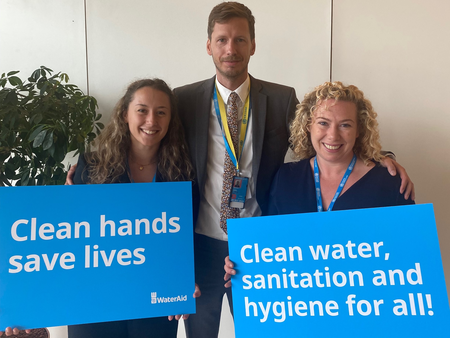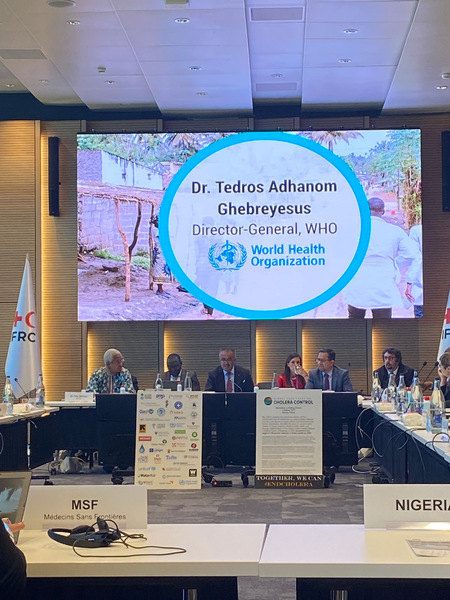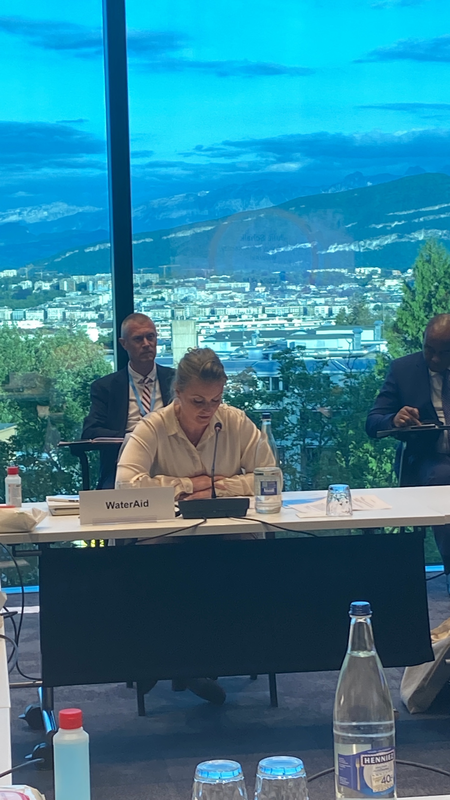Five ways WaterAid influenced the 75th World Health Assembly

After another year in which global health remained high in the headlines, and the world remained unprepared for another pandemic, Annie Msosa reports on the successes – and limitations – of this year's World Health Assembly.
The World Health Assembly (WHA) – the decision-making body of the World Health Organization (WHO) – meets every year, for health ministers and their delegations from the 194 members states to agree actions on urgent health issues.
This year's WHA was held under the theme “Health for peace: peace for health”. In 2022, COVID-19 has reminded the world of the devastating impact of remaining unprepared to tackle health emergencies, and the war in Ukraine is highlighting the impact of conflict on people’s health and wellbeing, and how peace is a pre-requisite for the achievement of good physical and mental health.
As the congregation deliberated, it was sobering to see member states admit that not only is the COVID-19 pandemic not yet over, but also the world is still not prepared for another pandemic. Urgent action is needed both to contain the current pandemic and to prepare WHO and member states for a future in which we are likely to face another. Member states discussed the framework to guide the global health architecture for preparedness and response to pandemics; improving the international health regulations to better support health emergencies; getting the world to 70% COVID-19 vaccine coverage; infection prevention and control; reclaiming the gains in health outcomes that have been lost due to the pandemic; and strengthening WHO as the leading institution on global health, among other agendas.
A chance to highlight the importance of water, sanitation and hygiene to global health
For WaterAid, the WHA and the months building up to it are an important opportunity to highlight the importance of clean water, sanitation and hygiene (WASH) to global health, and the need for policy and financing prioritisation of WASH in healthcare facilities and universal hand hygiene in the global health and pandemic preparedness and response agendas. Our task was clear: we wanted to see championship of WASH in healthcare facilities and universal hand hygiene in the language of WHO, member states, non-state actors and key donor countries during deliberations.
This is the first year since COVID hit that WHA delegates were allowed to attend in person – albeit with limitations on delegation sizes and modalities. WaterAid was represented by a small but mighty in-person delegation of four, who, together with a virtual delegation, worked to influence the proceedings around the WHA in many ways.
1. Promoting champions of WASH and health, and a stronger WHO
It was pleasing to see WASH championship evident early in proceedings. The UN Secretary General’s speech recognised WHO’s role in safeguarding access to water and sanitation, while the WHO Director General’s speech highlighted the need to reorient health systems to address the root causes of disease. Dr Tedros Adhanom Ghebreyesus noted that globally only 3% of health budgets is spent on promotion and prevention, when spending more on primary healthcare – which includes WASH – could halve the global disease burden.
He further committed to support member states to focus on high-impact transformations, one of which is ensuring every healthcare facility has access to water and sanitation. His re-election as WHO Director General for a second term is a strong endorsement of his leadership throughout the COVID-19 pandemic, and an opportunity for WaterAid and others working to promote universal WASH access to leverage his championship and work together to ensure WASH in healthcare facilities and communities remains a priority for WHO member states.
We also saw a landmark decision by member states to increase their funding to WHO by 50%, which we had called for through the pandemic preparedness action network. This funding overhaul will mean a more stable income stream for WHO, and increase its flexible funding to spend on its own priorities; strengthen the capacity of WHO country offices to support implementation of country-led health priorities; and make WHO stronger and more agile when responding to global health crises.
2. Meeting with high-level decision makers on WASH and health
We were reminded of the value of meeting with colleagues and allies and being able to deliver our advocacy messages in person. We met with Ministers of Health from Liberia and Malawi, with delegations from Togo, Tanzania and Sweden, and with EU Members of Parliament. We discussed the importance of WASH in healthcare facilities to women’s empowerment and safety as health workers, and to responding to future pandemics, and shared WaterAid’s work on WASH in healthcare facilities, hygiene and COVID-19.
3. Raising the profile of WASH in healthcare facilities and hand hygiene in official proceedings
We championed the importance of clean water, decent toilets and good hygiene for improved health outcomes bilaterally with member states in the build up to and during official discussions. We made a statement on the proposed resolution on infection prevention and control, highlighting the vital role of WASH in preventing patients from catching infections while receiving healthcare.
We therefore welcomed the adoption of the resolution, which calls for WASH infrastructure and resources to be made available in all healthcare facilities, at home and in community settings. We were particularly pleased by the explicit recognition of hand hygiene as key for infection prevention and control by the intervention from the EU representative, and by Germany’s recognition of the need to ensure IPC programmes integrate WASH.
4. Participating in high-level events on WASH and health
We attended the Global TaskForce on Cholera Control event, at which Zambia, Congo and Zanzibar’s health ministers spoke to the importance of WASH to their national efforts to tackle cholera, and Ethiopia and Kenya launched national cholera plans. We were pleased to hear Zambian President Hakainde Hichilema announce that he is now a Global Cholera Control Champion, and Dr Tedros’s continued commitment to support the elimination of cholera. WaterAid Sweden’s Julia Shalk highlighted the importance of political leadership and of WASH and health data sharing to best target resources to control and eliminate cholera.
5. Calling for civil society space in WHO governance processes
This year a last-minute decision by WHO and member states to limit the size of civil society delegations and remove online delegations meant marginalised groups couldn’t have their voices heard, further reinforcing the inequalities WHO has spoken against throughout the pandemic. We continue to call for civil society space to be protected in key health discussions, and made a formal statement on this, highlighting civil society’s transformative role in meeting global health opportunities and challenges, including improving access to WASH in healthcare facilities.
We also held a Twitter Space with civil society organisations and activists from the global south discussing the challenge shrinking civil society participation poses, and practical actions to address it and ensure better inclusion in key WHO governance processes such as the WHA and development of the International Treaty on Pandemic Preparedness.
Organisers of #WHA75 closed the doors to civil society organisations - meaning marginalised groups couldn't make their voices heard.
— WaterAid Global (@wateraid) June 6, 2022
Catch up on our Twitter Space where we discussed ways @WHO can better involve #CSOs in decision-making processes.https://t.co/2Du8c2rtlu
The opportunity for the world to make significant changes in the global health landscape is now. The policy choices governments make today could start us on a favourable path, or could condemn us to yet more human suffering when the next pandemic strikes. The IMF estimated the COVID-19 pandemic would cost the world US$28 trillion – ten times the African economy. And still millions of lives are being lost, directly and indirectly, because of it.
There has been enough suffering. Now is the time for the world’s leaders to take concerted action to make significant and lasting changes in the promotion of people’s health. WHA member states must urgently ensure the fundamental pillars of health system resilience such as WASH are non-negotiable in national and overseas development assistance budgets. This is a fundamental and no-regrets step in preparing us for the next pandemic.
Annie Msosa is WaterAid's Advocacy Advisor for Health. Follow our global advocacy activities on Twitter.
Top image: the main congress room at the 75th World Health Assembly, 2022.






